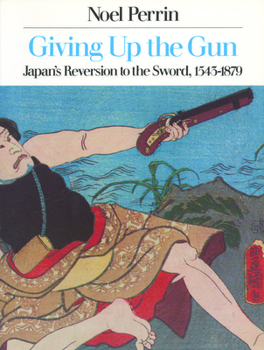Giving Up the Gun (Revised) (Revised)
Select Format
Select Condition 
Book Overview
Was there ever a time when a civilization, technically sophisticated, and in full possession of its senses, reverted in an earlier, less advanced technology? You bet - Japan, 1543-1879. During this... This description may be from another edition of this product.
Format:Paperback
Language:English
ISBN:0879237732
ISBN13:9780879237738
Release Date:January 1988
Publisher:Nonpareil Books
Length:136 Pages
Weight:0.45 lbs.
Dimensions:0.3" x 6.1" x 8.0"
Customer Reviews
5 ratings
It's no just about Japan
Published by Thriftbooks.com User , 14 years ago
What a wonderful book! I wondered if it was gonna be too academic to enjoy. On the contrary, it was a great read. The author says: "While I naturally hope that professional students of Japan will read this book, they are not the primary audience. The primary audience is the much larger group of people interested in the possibility of controlling technology". Go pick up this book, it's short but is full of amazing information about humanity.
Awesome book
Published by Thriftbooks.com User , 18 years ago
I am a Japanese and International Studies double major, and while I was in Japan last semester I picked this book for a research project, primarily because it was short and I had very little time to waste. Then I started reading, and the hours just slipped away as I diligently marked almost every page with sticky tabs and highlighter, because it was just that awesome. The paper I was supposed to write was only required to be 4-5 pages long; I ended up with 9 pages, after I cut out a lot of other info. This book is small, yes, but it is filled with useful information presented in an interesting way. I've always had issues with history books that take potentially fascinating subjects and make them dull and boring. This book, unlike most of it's genre, was absolutely enthralling. I could not put it down. It's short, it's cheap, and it's interesting. If you have any interest in Japanese history, I think you should pick up this book.
a bang
Published by Thriftbooks.com User , 20 years ago
I made the mistake of beginning to read this book before I went to bed. I read long into the night, unable to put it down.Perrin packs a great deal of information into this thin volume, livened with quiet humor. This book is an excellent complement to Sword and Chrysanthemum, because he deals with aspects of Japanese culture that Benedict did not.Perhaps in the final pages he sings praises a bit too loud, looking at feudal Japan as close to an ideal society. That was an age in which peasants took it for granted that Mother would be led into the forest and abandoned when food ran out. Life may have been peaches and cream for the upper classes, but Japan was certainly not a land in which it was 'impossible to discern misery.' I urge anybody with an interest in Japan, or in cultural evolution, to read this book.
Putting the Genie Back in the Bottle
Published by Thriftbooks.com User , 21 years ago
I read Noel Perrin's little book soon after it was first published in a different imprint, but returned to it around the time of the Gulf War in 1991 to remind myself of a few things that Professor Perrin wanted us to think about. I think many readers may mistake it as primarily a book about Japanese history or about the Tokugawa clan who banned guns mainly to maintain civil order in what was a genuine police state, one they were to rule for 250 years. Though a long-time student of Japan, I shudder to think of someone like Saddam Hussein picking up a few lessons from the Tokugawas. Perrin's point, though, was peace. He wrote this book, I believe, because he was a passionate anti-nuclear activist and advocate of non-proliferation. In talking to friends, he learned how the Tokugawas had - perhaps for the only time in human history - decided to give up a weapon of mass destruction, and they did it in part because they saw it as an evil, and a threat to their martial society. Samurai were expected to live and die by the sword, though the warlords who fought it out for control of Japan in the war-filled years around 1600 that brought the Tokugawas to power were perfectly happy to use massed muskets in battles that created more carnage than would be seen on any battlefield until the Napoleonic wars. At the end of the day, Perrin's assessment of the moral purpose of the Shoguns who banned the gun is probably naive, these were power hungry and paranoid dictators who sought to prevent massed musket attacks against themselves. But the book provides a fascinating vignette of how a society reordered itself and learned to live in peace for 250 years. I consider the book one of the more elegant essays on the confrontation in mankind's history between our inexorable bloodlust, and our yearning for something more sublime.
A Meaningful Book
Published by Thriftbooks.com User , 23 years ago
The story of going from one of the world's most armed nations to one where guns became rare is a fascinating one. I learned a lot about older Japan along the way. But that is not the main point. Perrin shows us that we need not become the slaves of every technology that comes along. Instead of being dominated by them, we can control and civilize them. This is a lesson that is badly needed today. It is needed if we are to make the world a safe and viable place for our children by eliminating weapons of mass desturction and reducing environmental damage.




